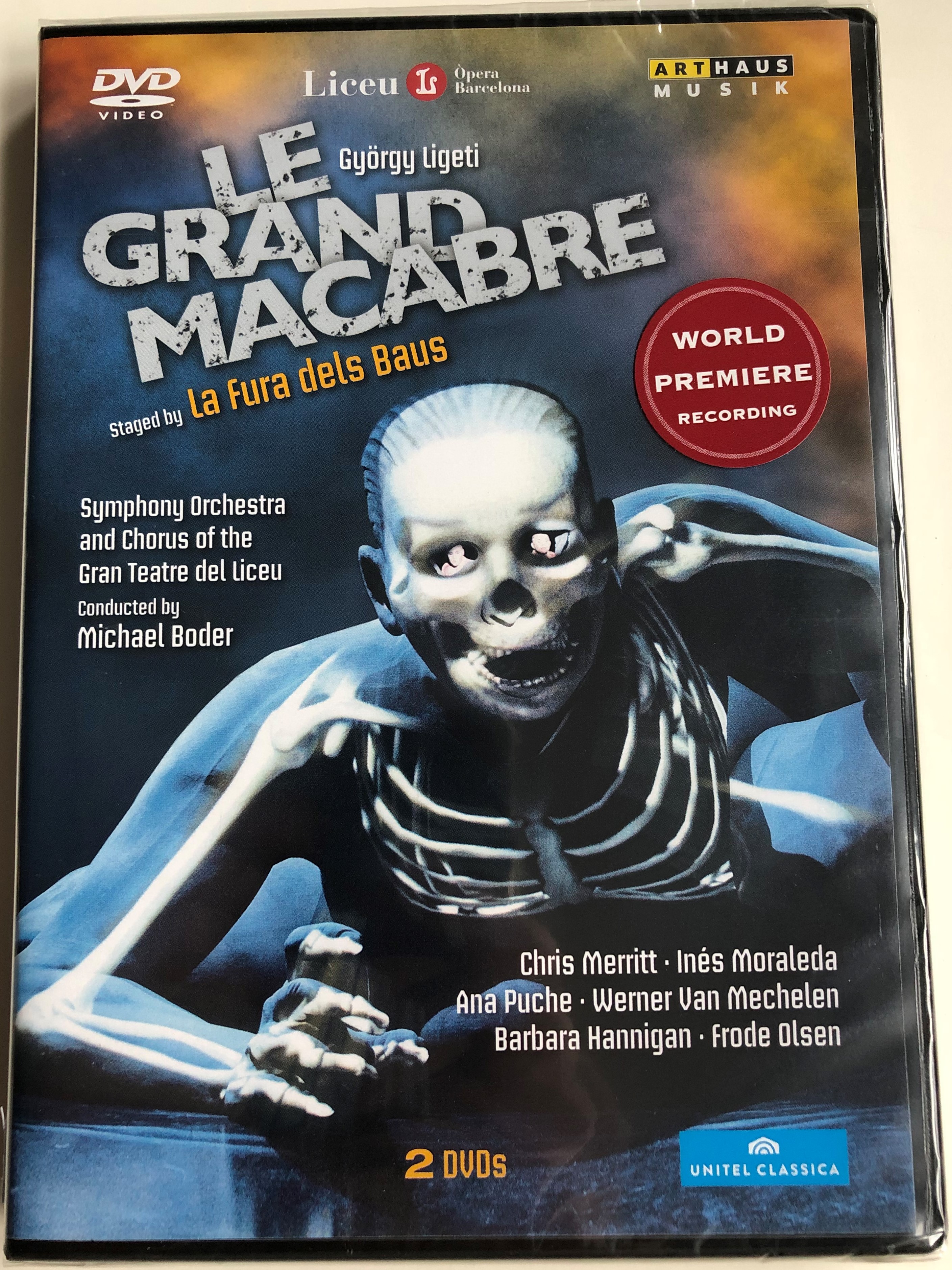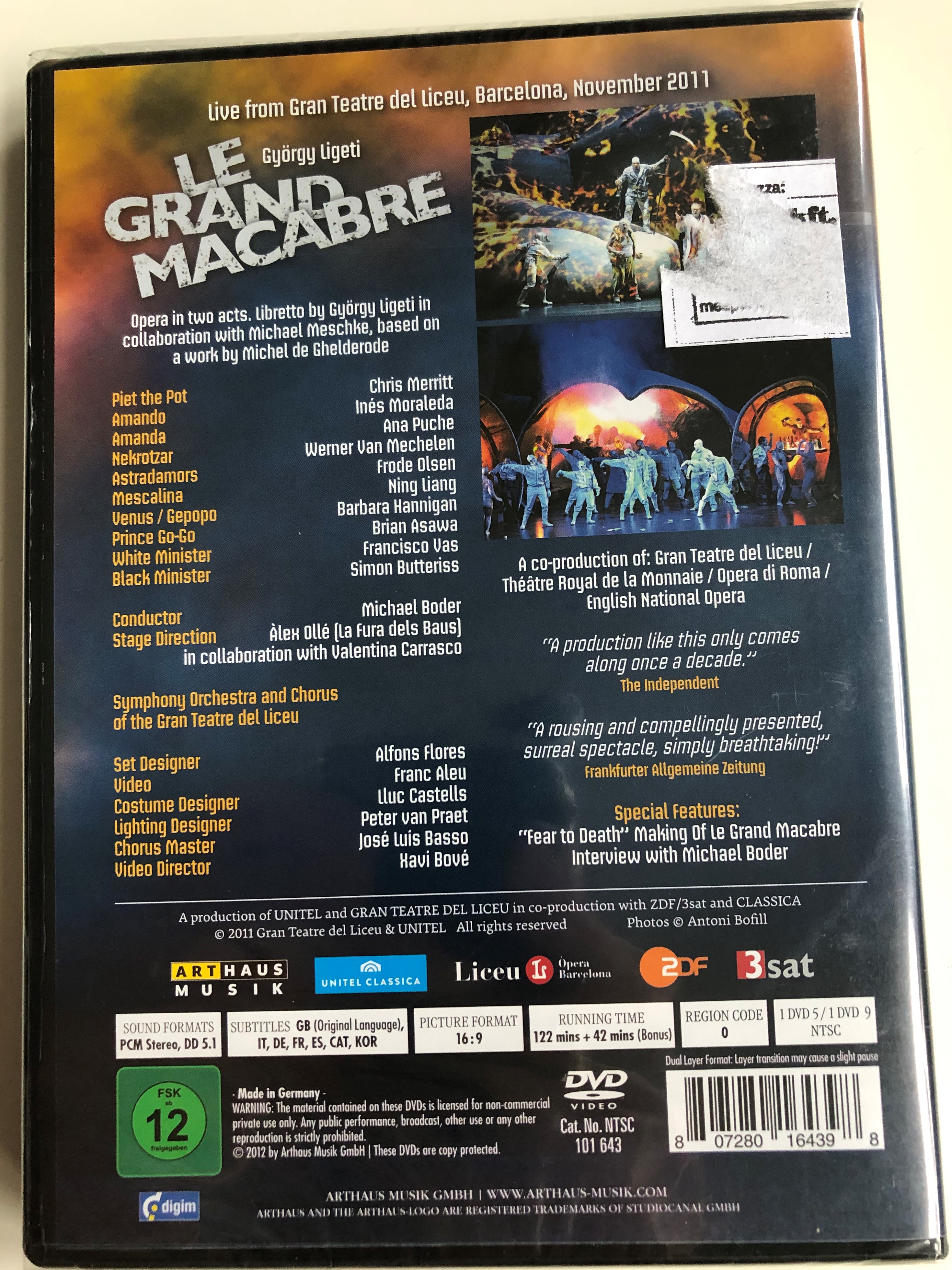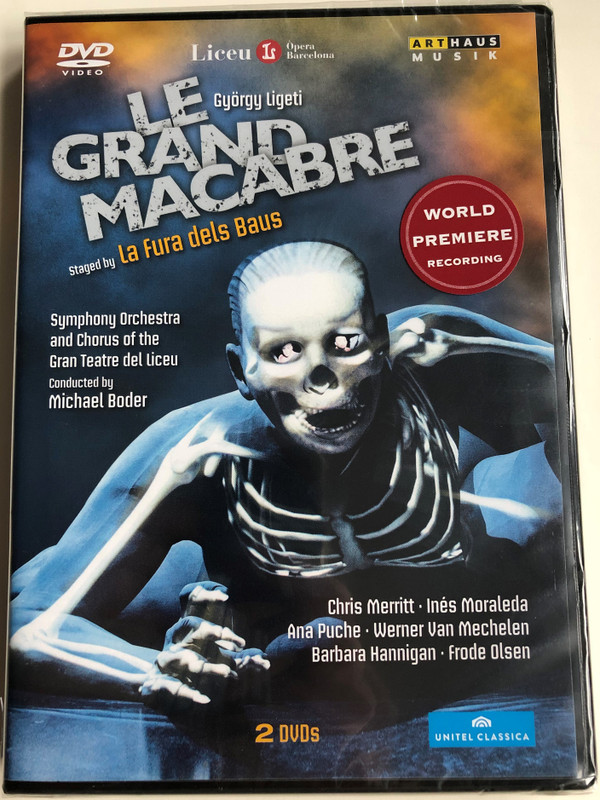Description
Le grand Macabre 2DVD 2012 World Premiere recording / Directed by Xavi Bové / Libretto by György Ligeti / Symphony Orchestra and Chorus of the Gran Teatre del Liceu - Conducted by Michael Boder
UPC 807280164398
REGION 0 NTSC DVD
AUDIO: English 2.0, English 5.1
Subtitles: English, Italian, German, French, Spanish, Korean
Total Runtime: 122 + 42 minutes (2 discs)
English Summary:
Barcelona’s Grand Teatre del Liceu presents György Ligeti’s sole opera “Le grand macabre” in a stunningly imaginative and highly theatrical production by La Fura dels Baus – a production that already claimed enormous success in Brussels, London and Rome and - as the British Independent proclaimed - “only comes along once a decade”. Ligeti’s (1923-2006) absurd-tragicomical masterpiece of the highest order blends popular theater, comics, pop art, cabaret, caricature and the Apocalypse with fascinating imaginativeness. The orchestra, for example, is enhanced with “instruments” such as car horns and doorbells. Ligeti himself – one of the great composers of the later 20th century – called his work an “anti-anti-opera.” Premiered in Stockholm in 1978, the work is based on a play by Michel de Ghelderode (1898-1962) and unfolds in an imaginary land inspired by the famous Dutch painter Pieter Brueghel the Elder: Nekrotzar, the Grand Macabre, announces the end of the world; but in a land ruled by eros, alcohol and corruption, his plan to unleash the Apocalypse bursts like a soap bubble. The people continue to lead their lives as before and refuse to be frightened by thoughts of death and a dark future… Masterfully rendering the colorful score is conductor Michael Boder and the orchestra and chorus of the Liceu. The top-notch cast includes Werner Van Mechelen as Nekrotzar, Chris Merritt as “Piet the Pot”, Barbara Hannigan as Chief of the secret police, and Brian Asawa as “Prince Go-Go”.
György Sándor Ligeti (/ˈlɪɡəti/; Hungarian: Ligeti György Sándor [ˈliɡɛti ˈɟørɟ ˈʃaːndor]; 28 May 1923 – 12 June 2006) was a Hungarian-Austrian composer of contemporary classical music. He has been described as "one of the most important avant-garde composers in the latter half of the twentieth century" and "one of the most innovative and influential among progressive figures of his time".[1]
Born in Transylvania, Romania, he lived in the Hungarian People's Republic before emigrating to Austria in 1956. He became an Austrian citizen in 1968. In 1973 he became professor of composition at the Hamburg Hochschule für Musik und Theater, where he worked until retiring in 1989. He died in Vienna in 2006.
Restricted in his musical style by the authorities of Communist Hungary, only when he reached the west in 1956 could Ligeti fully realise his passion for avant-garde music and develop new compositional techniques. After experimenting with electronic music in Cologne, his breakthrough came with orchestral works such as Atmosphères, for which he used a technique he later dubbed micropolyphony. After writing his "anti-anti-opera" Le Grand Macabre, Ligeti shifted away from chromaticism and towards polyrhythm for his later works.
He is best known by the public through the use of his music in film soundtracks. Although he did not directly compose any film scores, excerpts of pieces composed by him were taken and adapted for film use. The sound design of Stanley Kubrick's films, particularly the music of 2001: A Space Odyssey, drew from Ligeti's work and also contained pieces by other classical composers.
Ligeti György Sándor (Dicsőszentmárton, 1923. május 28. – Bécs, 2006. június 12.) Kossuth-díjas magyar zeneszerző.
Tanulmányait a kolozsvári zenekonzervatóriumban, majd a budapesti Zeneakadémián végezte, Farkas Ferenc, Bárdos Lajos, Járdányi Pál és Veress Sándor tanítványaként. Tanulmányai elvégzése után népzenekutatással foglalkozott. Romániában ösztöndíjasként több száz erdélyi magyar népdalt gyűjtött. 1950-től a budapesti Zeneművészeti Főiskolán zeneszerzést és ellenpontot tanított. Az 1956-os forradalom leverése után a kölni rádióhoz került külső munkatársként. Itt megismerkedett Karlheinz Stockhausennel, aki nagy hatással volt művészetére. 1959-ben Bécsben telepedett le, és 1967-ben megkapta az osztrák állampolgárságot. Állandó résztvevője volt a darmstadti nyári mesterkurzusoknak, vendégtanárként oktatott a stockholmi Zeneművészeti Főiskolán. Tanított Berlinben és a kaliforniai Stanford Egyetemen is. 1973-ban Hamburgban telepedett le, ahol a helyi zeneművészeti főiskolán zeneszerzéstanári állást vállalt.
Stockhausen hatására szerezte 1958-ban az első elektronikus művét, az Artikulationt. Ez a műve és a nagyzenekarra írt, 1961-es Atmosphères azonnal meghozta számára az ismertséget a nyugat-európai zenei életben. Ligeti azonban hamar kiábrándult az elektronikus zenéből, és ismét a hangszeres zene került figyelmének középpontjába. Zenéjének leginkább felismerhető vonása valamiféle neodadaista érzékenység a humor és az abszurd iránt, ami kendőzetlenül mutatkozik meg olyan darabokban, mint a Poème symphonique, amelyben száz metronóm ketyeg egyszerre, mindegyikük más tempóra beállítva, míg végül csak egy marad. A másik jellemzője Ligeti zenéjének a meccanico mozgástípus, ami azt jelenti, hogy a zene gépszerű, hangzásában mechanikus és precíz. A zene lényege, hogy a zenész úgy játszik a hangszeren, mintha az egy gép lenne. Az elektronikus zenével végzett kísérleteinek eredményeképp szakított azzal a felfogással, hogy a zenét diszkrét hangokból összerakott dallamokból-akkordokból állítsa össze, ehelyett egy képlékeny hangmassza mozgatására koncentrált. Ennek a zenének a leírására vezette be a mikropolifónia fogalmát. Élete kései szakaszában zenéjében is megjelent a metrika, majd a harmónia is.
























